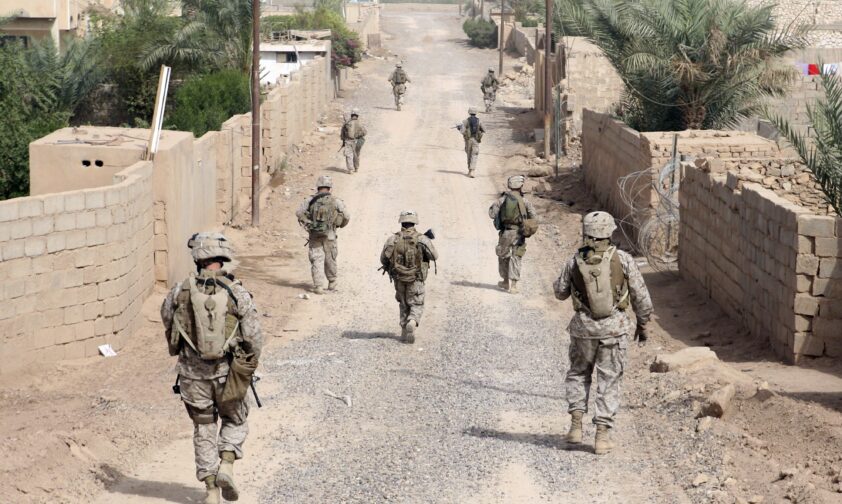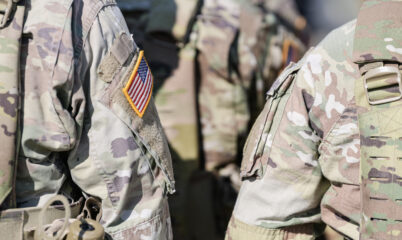
Q&A with CVA Policy Director Tyler Koteskey: A look back at the War in Iraq 20 years later
In 2003, the third-generation iPod debuted, Pirates of the Caribbean hit the big screen, the Cleveland Cavaliers drafted LeBron James, and Arnold Schwarzenegger was elected governor of California.
The Iraq War also started that year.
20 years later, American troops are still being deployed to Iraq.
To recognize the 20th anniversary of the Iraq War, we asked CVA Policy Director Tyler Koteskey some important questions about why the U.S. went to war in Iraq, the war’s cost, and how the lessons learned from the Iraq War should guide America’s foreign policy in the future.
Q: Set the tone for us first, Tyler. Why did the U.S. go to war with Iraq?
A: There were a few reasons. First, many mistakenly believed Iraqi President Saddam Hussein had cooperated and worked with al-Qaida, the perpetrators of the Sept. 11 terrorist attacks, a narrative promoted by senior Bush administration officials from shortly after 9/11. Sept. 11 was still very raw and real for Americans at the time, so the idea of another target in addition to Osama bin Laden and al-Qaida really fueled the desire people understandably felt for justice.
Second, Congress and the American public were repeatedly given flawed intelligence that Iraq had weapons of mass destruction. The White House used motivated reasoning to selectively prioritize information from the intelligence community that fit its preferred conclusion on Iraqi WMDs, without appropriately weighing the quality of the sources.
This pattern of cherry-picked data that overstated the case for an Iraqi WMD program to the public went hand in hand with a movement of foreign policy experts and journalists vigorously supporting the war and questioning the patriotism of those who opposed it.
Q: We have the benefit of hindsight now with the Iraq War. But was the war as unpopular at the beginning as it became later?
A: No. Many Americans supported the Iraq War at the beginning, which isn’t surprising given the information we were hearing every day about WMDs.
A Gallup poll in the first few days of the war showed 72% of Americans supported the war in Iraq when it started. It was a reasonable conclusion to draw.
It wasn’t until the war was in full swing, mission creep began, and the truth about WMD evidence came out that the public started questioning the wisdom of invading Iraq.
That said, it is important to remember that a minority of leading international relations experts vocally opposed the war from the beginning on the grounds that it was not in America’s national interest and would distract from the fight against al-Qaeda―several even went so far as taking out a full-page ad in the New York Times in late 2002.
Q: Talk about how the Iraq War mission started and what it turned into.
A: On March 19th, 2003, the United States opened the invasion of with a “shock and awe” phase of airstrikes, followed by troops on the ground. In just three weeks, U.S. and coalition troops removed Saddam Hussein from power, and in May 2003, President George W. Bush declared “mission accomplished” in Iraq.
As the U.S. mission in Iraq turned into an open-ended nation-building and counterinsurgency operation, that declaration didn’t age well.
When Hussein’s dictatorship fell, the whole Iraqi political system was upended, and a power vacuum emerged. Insurgencies started popping up around the country to fill the vacuum, fueled by short-sighted decisions, such as disbanding the Iraqi army. Sunni and Shia extremists took advantage of the chaos to pursue vicious sectarian conflicts, resulting in hundreds of thousands of Iraqi civilian deaths.
From late 2006, a change in counterinsurgency strategy helped temporarily improve stability. U.S. engagement with Sunni tribal elders, known as the Anbar Awakening, significantly reduced al-Qaida in Iraq’s (AQI’s) power in their western strongholds. Unfortunately, many of these successes were squandered by an Iraqi government willing to disenfranchise its political rivals, a painful lesson in the ways nation-building can fall short.
Ultimately, the Iraqi government’s failures helped create the conditions for AQI to transform and emerge as ISIS in 2013. The group’s dramatic capture of Mosul laid bare the Iraqi Army’s weaknesses, resulting in ISIS commandeering over 2,300 U.S.-made Humvees originally provided to the Iraqi security services. After a six-year campaign involving the forces of every regional power, the last ISIS-controlled town fell in 2019.
Since then, U.S. forces remain in Iraq on an open-ended train-and-equip mission, where they are still targeted to this day by Iranian-backed militias, some of whom have ties to elements of the very Iraqi security forces our troops are there to support.
Q: Was the Iraq War justified or considered a success?
A: The Iraq War was one of the United States greatest foreign policy blunders. The men and women responsible for promoting the idea that this conflict was necessary should be remembered for their role when opining on future foreign policy crises.
It is true that Saddam Hussein was a detestable and murderous tyrant, but removing him from power wasn’t worth the costs in American lives, resources, and strategic setbacks the invasion caused, or the chaos it unleashed on innocent Iraqis.
We know that American troops who fought in Iraq served with bravery and courage and should be proud of their service, which they undertook seeking both to protect America and help the Iraqi people.
We have a continuing responsibility to honor their sacrifices. This means refraining from sending our troops into similar missions in the future without reflecting on the costs. We must forever keep in mind how American patriotism, after the Sept. 11 attacks, was misused by our leaders in service of an unnecessary war that did nothing to bring the 911 perpetrators to justice.
It’s now clear that invading Iraq did not meet the criteria that Colin Powell, who famously gave a speech in the U.N. Security Council supporting the war, had previously outlined for when to resort to military force. A vital national interest was not under threat, there was no clearly achievable objective for troops at a reasonable cost, and we had not planned an exit strategy or sufficiently considered the long-term strategic consequences of military action.
As U.S. leaders transitioned our Iraq deployment into a nation-building operation, our troops were asked to help establish democracy in a country that never asked for it. This kept our service members in harm’s way in pursuit of an objective the military should not have been expected to perform as our leaders tried to figure out the next steps.
Q: Let’s talk about the impact of the war. How much did the Iraq War cost the United States?
A: The war in Iraq is likely to cost the U.S. an estimated $3 trillion. That number is still going up because our troops remain on the ground in Iraq under a “train and equip” mission.
But outside of direct war costs, that figure includes related increases in the defense budget to support the war, additional interest on our national debt due to our spending on it, and the long-term cost of caring for Iraq War veterans after their service. More than 32,000 Americans were wounded in action in Iraq. Services such as disability benefits, basic health care, specialized care for combat-specific injuries, toxic exposure care, and mental health care all add up to over $230 billion dollars over the next few decades.
Q: How many Americans died in the Iraq War?
A: More than 4,500 Americans have been killed in action in Iraq, nearly twice as many lives as we lost in Afghanistan. Troops are still in danger there today, even though the Biden administration has redesignated their deployment as a train-and-equip mission, so that 4,500 number could very well grow.
Another alarming impact has been the surge of veteran suicides. Four times more post-9/11 veterans have died from suicide than have been killed in action. So when you think about the deaths associated with the Iraq War, the number is much higher than the thousands killed in Iraq. We need to be thinking about these tragic, less well-known consequences that can result from the use of military force when making decisions about when to send our men and women in uniform into harm’s way.
Q: 20 years later, what are the lessons learned from Iraq? And how can our leaders apply them?
A: The main lesson of the war in Iraq is that there are harsh, irreversible human and strategic consequences for irresponsible foreign policy decisions.
Our troops were put in the position of having an unachievable mission, despite their honorable service. There are tens of thousands of veterans and military families that feel those consequences of the Iraq War every day, and the United States is still paying the strategic price of this war of choice.
Strategically, invading Iraq squandered the international goodwill America enjoyed after the Sept 11 terror attacks. Toppling Saddam also enabled greater Iranian influence across the Middle East by removing a key check on its activities. Our deployment wore out important assets, such as our B-1 bomber fleet through heavy use and delayed several modernization efforts because of our decades-long emphasis on counterinsurgency over great power deterrence.
Of course, sometimes wars need to be fought, but we need to think carefully about their potential consequences and whether putting our military in harm’s way is necessary to protect vital national interests.
We at CVA hope that leaders look back on the Iraq War 20 years later and see it as an unnecessary blunder―a war of choice that was disconnected from our national interests and which tarnished America’s global image while leaving us no safer. We should be concerned with our own national security interests and the safety of our people first, and we should stay out of conflicts where neither of those are in jeopardy.
The 20th anniversary of the Iraq War is also an important reminder that Congress should take a more active role in deciding when we choose to put our troops in harm’s way, as the Constitution demands. The 2002 Authorization for Use of Military Force, used as the legal basis for the invasion of Iraq, is still on the books decades later. While it remains active, the 2002 AUMF could be misused by a future president to begin another ill-advised war in the Middle East without Congress’ approval. Outdated war powers authorizations such as the 2002 AUMF should be repealed so that Congress can properly debate and vote on whether sending our troops into any given conflict is necessary to protect our vital interests.
After 20 years, American troops are still on the ground in Iraq and are still regularly targeted by militias, despite having no clearly achievable mission related to our core security interests. It’s high time we honor the sacrifice of those who served and bring all the troops home from Iraq.
Read more about our solutions to End Endless War and bring all troops home from Iraq.




